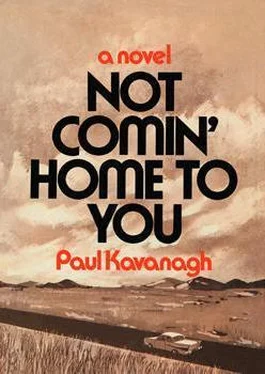Paul Kavanagh - Not Comin' Home to You
Здесь есть возможность читать онлайн «Paul Kavanagh - Not Comin' Home to You» весь текст электронной книги совершенно бесплатно (целиком полную версию без сокращений). В некоторых случаях можно слушать аудио, скачать через торрент в формате fb2 и присутствует краткое содержание. Город: New York, Год выпуска: 1974, ISBN: 1974, Издательство: G.P. Putnam's Sons, Жанр: Криминальный детектив, на английском языке. Описание произведения, (предисловие) а так же отзывы посетителей доступны на портале библиотеки ЛибКат.
- Название:Not Comin' Home to You
- Автор:
- Издательство:G.P. Putnam's Sons
- Жанр:
- Год:1974
- Город:New York
- ISBN:978-0-399-11357-4
- Рейтинг книги:3 / 5. Голосов: 1
-
Избранное:Добавить в избранное
- Отзывы:
-
Ваша оценка:
- 60
- 1
- 2
- 3
- 4
- 5
Not Comin' Home to You: краткое содержание, описание и аннотация
Предлагаем к чтению аннотацию, описание, краткое содержание или предисловие (зависит от того, что написал сам автор книги «Not Comin' Home to You»). Если вы не нашли необходимую информацию о книге — напишите в комментариях, мы постараемся отыскать её.
Not Comin' Home to You — читать онлайн бесплатно полную книгу (весь текст) целиком
Ниже представлен текст книги, разбитый по страницам. Система сохранения места последней прочитанной страницы, позволяет с удобством читать онлайн бесплатно книгу «Not Comin' Home to You», без необходимости каждый раз заново искать на чём Вы остановились. Поставьте закладку, и сможете в любой момент перейти на страницу, на которой закончили чтение.
Интервал:
Закладка:
A few miles back he’d stopped at a diner to use the toilet, and he’d considered dropping another bennie at the time. He’d decided to wait awhile, and now he was glad of it. Because while it was no big deal to see an occasional deer who wasn’t there, or a car or a person or a shadow, it was a clear enough sign that it was time to let things spin out a little on their own, time to pull the pin and let the spool unwind.
He drove past the first motel, drove for a quarter of a mile, then turned around and came back. It was a way to leave the impression that he was coming from the north and heading down toward Texas, but by the time he made the turn he realized it was a waste of effort. Because nobody in the motel would notice which way he had come from, let alone attach enough significance to it to remember it when some policeman turned up in a month or a year.
Something to guard against, he thought. There was just no sense in being too smart. Not with other people as dumb as they were. Just doing the things that mattered was as much as you had to bother with.
The motel was a U-shaped building of concrete block, with the office in back at the bottom of the U. There were a dozen rental units on either side of it. The concrete block had been given a wash with a rusty shade of pink that was starting to fade where the sun hit it the most. The doors and window trim were blue, just a shade darker than the Toronado. There was a small swimming pool in the center of the complex, and he thought he might have a swim until he noticed that the water had a green scum on the top of it and the sides of the pool were stained with algae. He thought of going to another motel, not for the sake of swimming now but because a motel with no pool at all was preferable to a scummy one. But he just didn’t want to drive any more just now, not with the roads filling up with deer that were there one minute and gone the next.
If the room was dirty, he’d simply leave. It wasn’t costing anything anyway; the vacancy sign had four smaller signs hanging from it, indicating the credit cards that were honored there, and Walker P. Ferris was three for four.
The man behind the desk had rimless glasses and cheap false teeth. He looked as though he knew the paint was fading and the pool scummy but just couldn’t bring himself to do anything about it. His flesh had shrunk around the cords in his neck. When Jimmie John asked for a single he said, “Rooms are twelve dollars, all the same price.” He said it as though he had been saying it twenty times a day for fifteen years.
The room was cleaner than he had expected. There was a band of paper over the toilet seat and the water tumblers were sealed in plastic wrap. The water had an iodine smell to it and he knew it wouldn’t stay down, but he felt the urge to retch and drank a glassful and threw up carefully into the toilet. His mouth and throat tasted strongly of bile. He drank another glass of water and repeated the process and felt better.
He took a long deliberate shower and scrubbed himself thoroughly. He got his razor and shaving soap from the Delta Airlines bag and shaved until there was no stubble, not even against the grain. He used the last of his after-shave lotion and dropped the empty bottle in the plastic trash basket.
Also in the flight bag was a four-ounce bottle. The label said it contained elixir of terpin hydrate and codeine, that if drowsiness occurred one should avoid driving or operating machinery, that the preparation might be habit-forming, and that persistent coughs should be brought to the attention of one’s physician. The bottle was a little more than half full. He drank about an ounce of the mixture, at first grimacing automatically at the awful taste of it, then enjoying its warmth in his throat and stomach.
He tried to recall just where and when he had obtained the flight bag. He knew he’d had it a couple of months, and that he had acquired it in a bus terminal while its owner was standing on a ticket line. But he couldn’t be sure where the terminal was or what the owner had looked like. He did remember that the owner was female, because the bag’s contents had consisted primarily of unwashed stockings and underwear. A disappointment, that — he’d hoped to find something useful, and wound up quickly discarding everything but the bag itself.
And he’d probably be getting rid of it, too, before long. It was cheaply made and one seam was already starting to go. Well, he had Walker P.’s suitcase in the car trunk. He’d have to have a look at it soon. Have to see whether it, or anything inside it, would be useful. Have to get rid of anything that wasn’t.
But not just now, thank you. Chores could wait. He still had to wash out his socks and underwear so they’d dry by morning, and maybe wash his shirt, too, if he felt ambitious. But not just yet.
He stretched out naked on the bed and let the air-conditioner finish the job of drying him. He closed his eyes and let his hands take inventory of his body. He located an ingrown hair just above his right knee and sat up for a moment to attend to it. He lay flat again, eyes open, staring sightless at the ceiling.
The cough syrup, added to his own exhaustion, was taking command of the amphetamine he had been taking all day. His mind was starting to spin free and loose now. Even with his eyes open, his retinae were screening a haphazard stream of pictures, the random fragments of waking dreams. He saw a furious montage of sharply delineated faces, faces of people he had never seen in life. It wouldn’t go away. He could turn it off completely for awhile, but he couldn’t fix on one particular face and try to hold onto it for a long close look. The faces were like the dreams he tried to clutch at on awakening. Like grabbing smoke.
He thought about going out for something to eat. And decided nothing was worth leaving the room for, and certainly not food, which he would almost certainly not hang onto anyway. Better just to lie here, he thought, and then he stopped thinking entirely.
About an hour later he blinked several times, took a deep breath, and got out of bed. He washed his socks and shirt and underwear and hung them up to dry. He had the flight bag unzipped, ready to shave again, before he remembered that he had shaved earlier. He did run his hands over his face, though, to convince himself that shaving was truly unnecessary.
And then he had to unzip the flight bag again anyway for the reds. There were not many left, and he would have to remember to score some soon.
He took two, drank a glass of the foul water, and went right to sleep.
MODERATOR: In other words, Dr. Rasmussen, you see these tragic occurrences as symptomatic of some of the flaws in our social structure? Could you comment further on that for our radio audience?
RASMUSSEN: Certainly. We have evolved into a highly mobile society. This mobility has been attained at the expense of a solid and permanent social structure. Our youth grow up with a sense of infinite possibilities, and at the same time with a lack of roots. Nothing is established, nothing is predetermined. The young person owes no allegiance to family, to community, to society at large.
HEGLER: I wonder if I could comment on that?
MODERATOR: Dr. Hegler.
HEGLER: I wouldn’t presume to take issue with Dr. Rasmussen. Certainly the decline in the nuclear family and the lessening importance of the tight-knit community have been not without effect. But these alone do not explain individual outbursts of violence.
RASMUSSEN: I was merely attempting to put this incident in a social context.
HEGLER: Yes, of course. My point is that the particular pressures upon the individual may do more to tell us why one member of society turns to violence while another does not. In this particular instance I think we would do well to look to our old friend, the Oedipus complex.
Читать дальшеИнтервал:
Закладка:
Похожие книги на «Not Comin' Home to You»
Представляем Вашему вниманию похожие книги на «Not Comin' Home to You» списком для выбора. Мы отобрали схожую по названию и смыслу литературу в надежде предоставить читателям больше вариантов отыскать новые, интересные, ещё непрочитанные произведения.
Обсуждение, отзывы о книге «Not Comin' Home to You» и просто собственные мнения читателей. Оставьте ваши комментарии, напишите, что Вы думаете о произведении, его смысле или главных героях. Укажите что конкретно понравилось, а что нет, и почему Вы так считаете.












